外研版选修6 Module 1 Small Talk Readng and listening &Reading and writing课件(36张ppt)
文档属性
| 名称 | 外研版选修6 Module 1 Small Talk Readng and listening &Reading and writing课件(36张ppt) | 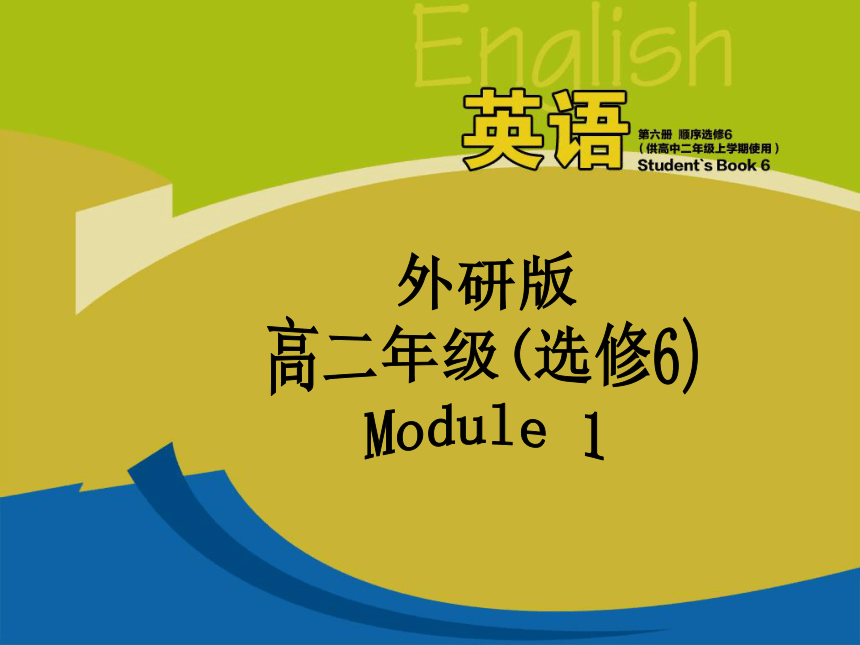 | |
| 格式 | zip | ||
| 文件大小 | 2.4MB | ||
| 资源类型 | 教案 | ||
| 版本资源 | 外研版 | ||
| 科目 | 英语 | ||
| 更新时间 | 2022-02-11 21:42:20 | ||
图片预览


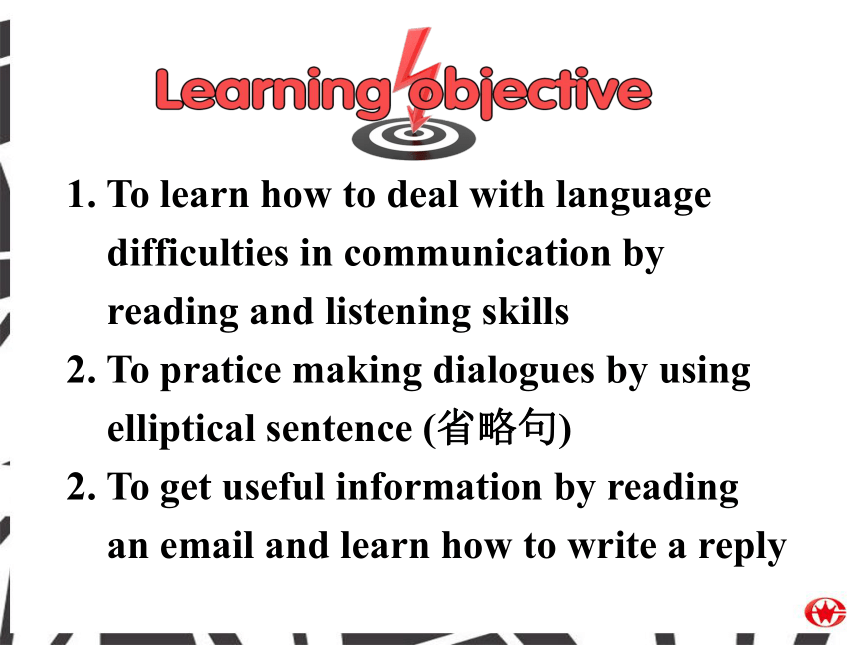

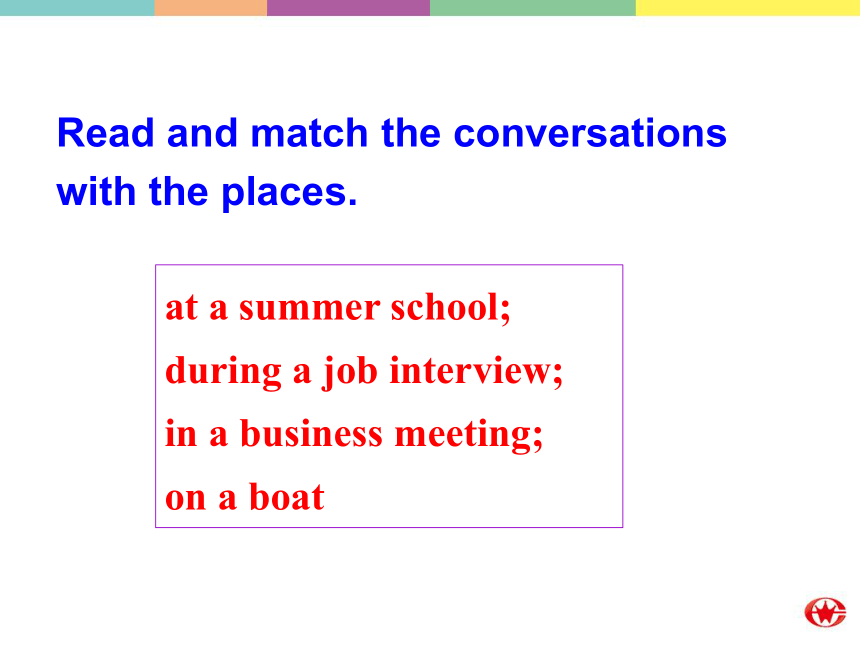

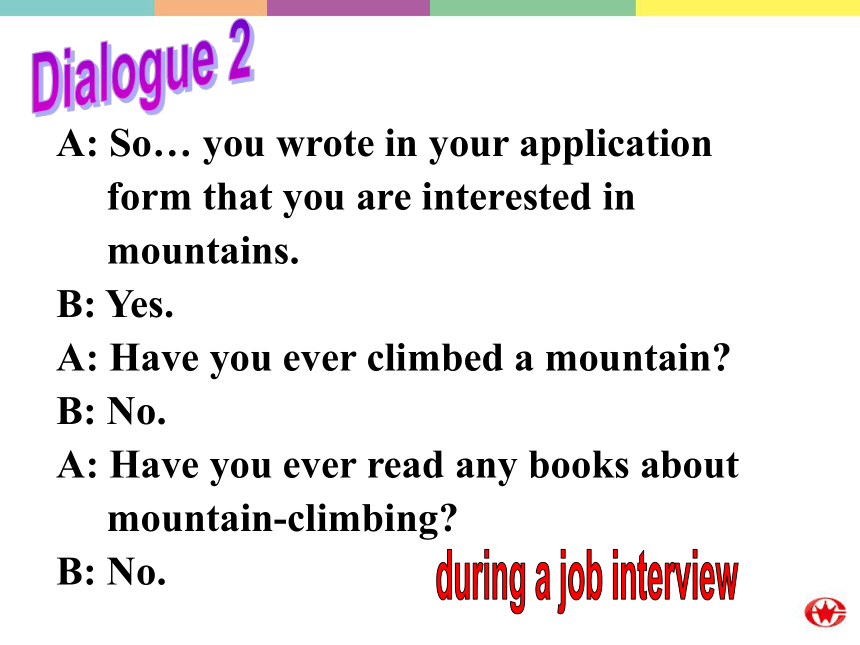
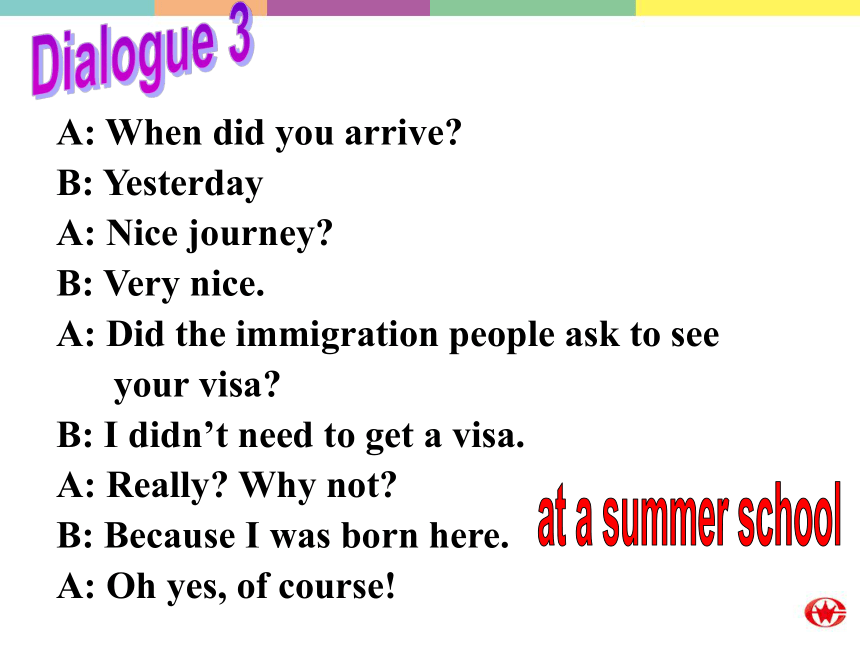
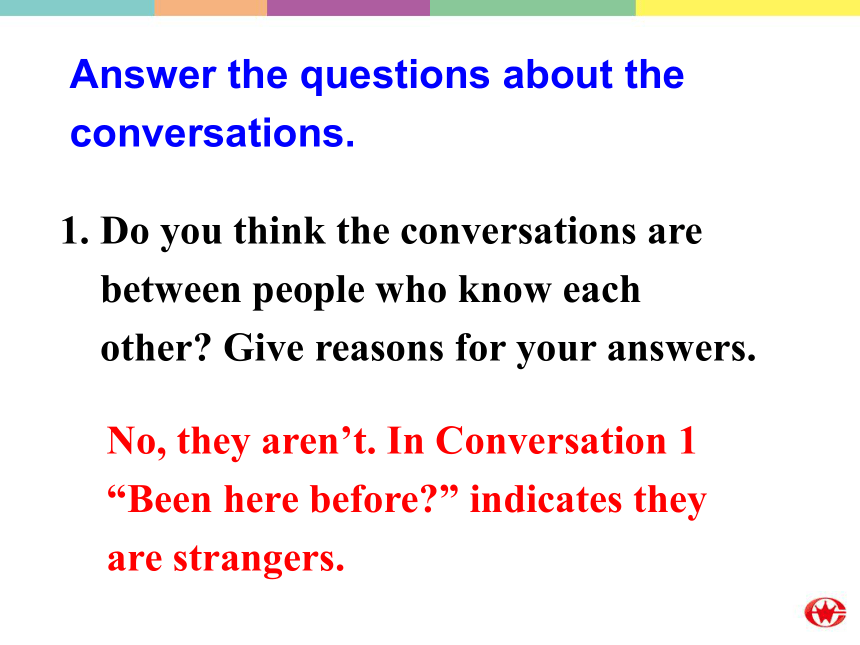
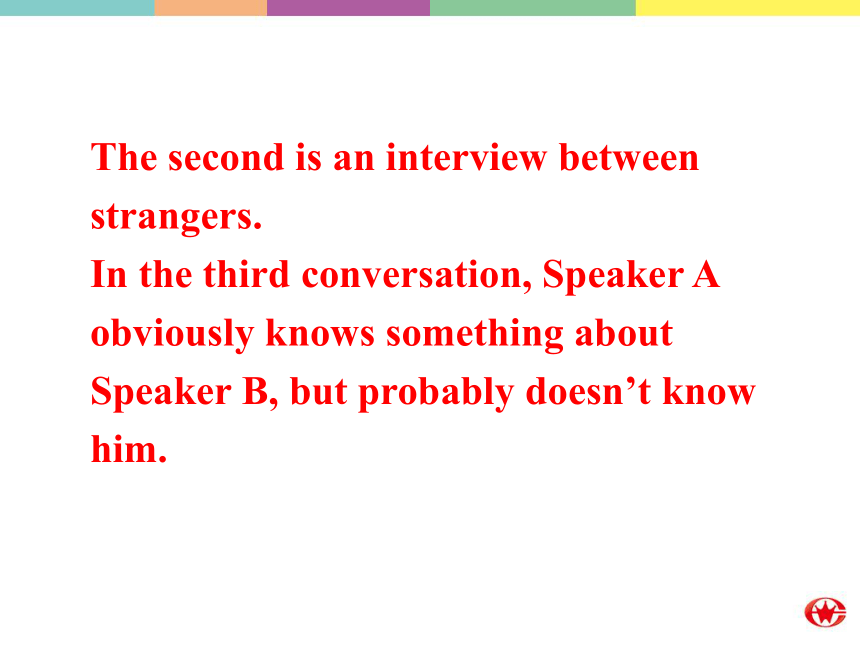
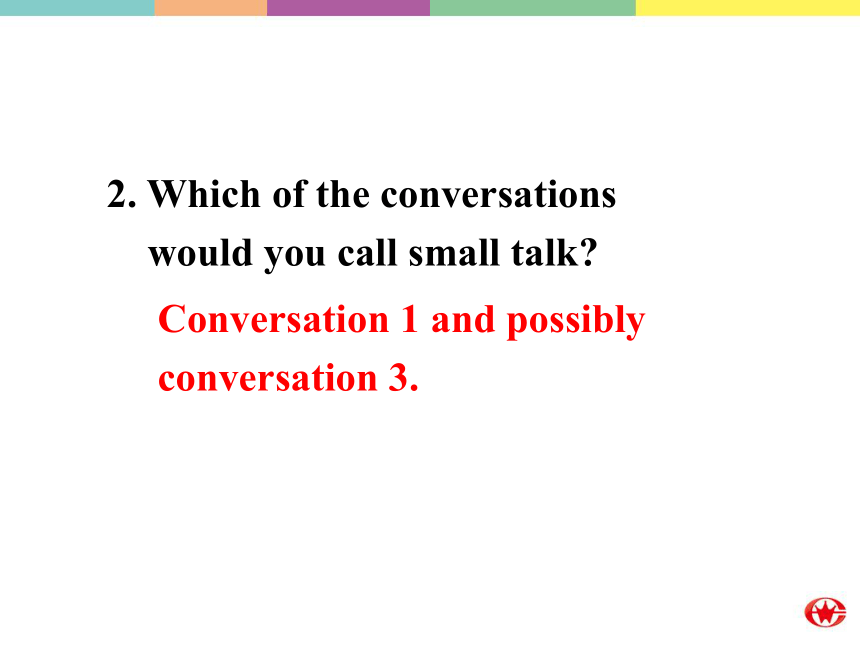

文档简介
(共36张PPT)
1. To learn how to deal with language
difficulties in communication by
reading and listening skills
2. To pratice making dialogues by using
elliptical sentence (省略句)
2. To get useful information by reading
an email and learn how to write a reply
at a summer school;
during a job interview;
in a business meeting;
on a boat
Read and match the conversations
with the places.
A: Wonderful, aren’t they
B: Er… I’m sorry
A: The cliffs.
B: Oh, yes, they are.
A: Been here before
B: Pardon
A: So… you wrote in your application
form that you are interested in
mountains.
B: Yes.
A: Have you ever climbed a mountain
B: No.
A: Have you ever read any books about
mountain-climbing
B: No.
A: When did you arrive
B: Yesterday
A: Nice journey
B: Very nice.
A: Did the immigration people ask to see
your visa
B: I didn’t need to get a visa.
A: Really Why not B: Because I was born here.
A: Oh yes, of course!
Answer the questions about the
conversations.
No, they aren’t. In Conversation 1 “Been here before ” indicates they are strangers.
1. Do you think the conversations are
between people who know each
other Give reasons for your answers.
The second is an interview between strangers.
In the third conversation, Speaker A obviously knows something about Speaker B, but probably doesn’t know him.
2. Which of the conversations
would you call small talk
Conversation 1 and possibly conversation 3.
3. What do you think about the answers
in the interview
(a) The answers show that the
interviewee is interested in the job.
(b) The answers are too short.
(c) The answers are impolite.
Listen to the whole of the first conversation and answer the questions.
1. Do the people both speak
English as a first language
No, they don’t.
2. Why did the woman have problems
understanding what the man was
saying
3. How did the man help her to understand
him better
Because she needed a few seconds to get used to his voice.
He spoke slowly and repeated things.
Sorry, I couldn’t ______.
(a) hear what you said.
(b) understand what you said.
Listen again and choose the correct endings to the Lines from the conversation.
2. I didn’t _______.
(a) like what you said.
(b) catch what you said.
3. Could you ______
(a) repeat what you said.
(b) explain what you said.
4. You needn’t have ______.
(a) spoken to me
(b) spoken so slowly.
5. I just needed a few seconds _____.
(a) to get used to your voice.
(b) to understand your voice.
在口语交际中,当我们遇到听不清对方在讲什么或者没理解对方的意思的时候,我们可以用下列表达:
Pardon
Sorry, I couldn’t hear what you said.
I didn’t catch what you said.
Could you repeat what you said
总结
1. Wonderful. aren’t they (They’re wonderful, aren’t they )
2. Been here before (Have you been here before )
Look at the sentences. Notice how certain words are left out in informal conversation.
Now make complete sentences from the examples.
1. Language course
Are you taking (doing / going to do) a
language course
2. Staying long
Are you staying long
3. Going anywhere nice
Are you going anywhere nice
4. Lovely place.
It’s a lovely place.
5. Go there a lot.
I go there a lot.
6. Never been there.
I’ve never been there.
having lunch at school, a person we
both know, doing homework, football
match, an interesting book
Work in pairs. Choose one of the following topics and make dialogues using at least two elliptical sentences (省略句)。
A: Going home to have lunch
B: Yes. And you
A: Me I usually have lunch at
school.
B: Nice
A: Not really.
B: Why not go back home
A: Too far.
A possible dialogue:
Read the e-mail and answer the questions.
1. What’s the main purpose of this email
2. Can you find out the questions Alex has
Alex wants to ask for some advice. He needs to know what he can talk about with the Chinese people he meets.
Are there any questions that you shouldn’t ask people in China
What sort of things do Chinese teenagers like talking about
What sort of things do they find boring
Discuss the writer’s questions.
1. Are there any questions that you shouldn’t ask people in China
2. What sort of things do Chinese teenagers like talking about
3. What sort of things do they find boring
Write a reply. Answer the main questions and offer other advice. Use some of the following sentences to start and finish your email.
Very nice to hear from you.
Thank you for your interesting email.
How are you It’s a long time since I heard from you.
I hope this information has been useful.
Best of luck at the Chinese Embassy.
Looking forward to hearing from you again soon.
【写作指导】
一、审题定调
本写作任务要求写一封电子邮件,属于应用文。人称以第一和第二人称为主,时态需根据语境而定。因与收信人之间是朋友关系,写作时语言不应过于正式,可采用相对非正式的表达。
二、谋篇布局
电子邮件的格式和普通信件一样,包括信头、称呼、正文、结束语和签名。邮件的信头通常不用写出,同学们只需要写出其它部分即可。其中,邮件的正文是重中之重。
本写作可分为三部分:
第一部分:收到邮件的心情并引出话题;
第二部分:具体回复邮件中所提到的问题;
第三部分:结尾(表达愿望)。
三、组织语言
1. 第一段:收到邮件的心情并问候对方及
对方的家庭。
2. 第二段:针对邮件里提出的如何和首次
见面的中国老师和学生展开聊天的问题
进行回答。
3. 第三段:表达愿望。
1. Try to make an informal conversation with your partner and share with yours classmates tomorrow.
2. Finish your reply letter.
1. To learn how to deal with language
difficulties in communication by
reading and listening skills
2. To pratice making dialogues by using
elliptical sentence (省略句)
2. To get useful information by reading
an email and learn how to write a reply
at a summer school;
during a job interview;
in a business meeting;
on a boat
Read and match the conversations
with the places.
A: Wonderful, aren’t they
B: Er… I’m sorry
A: The cliffs.
B: Oh, yes, they are.
A: Been here before
B: Pardon
A: So… you wrote in your application
form that you are interested in
mountains.
B: Yes.
A: Have you ever climbed a mountain
B: No.
A: Have you ever read any books about
mountain-climbing
B: No.
A: When did you arrive
B: Yesterday
A: Nice journey
B: Very nice.
A: Did the immigration people ask to see
your visa
B: I didn’t need to get a visa.
A: Really Why not B: Because I was born here.
A: Oh yes, of course!
Answer the questions about the
conversations.
No, they aren’t. In Conversation 1 “Been here before ” indicates they are strangers.
1. Do you think the conversations are
between people who know each
other Give reasons for your answers.
The second is an interview between strangers.
In the third conversation, Speaker A obviously knows something about Speaker B, but probably doesn’t know him.
2. Which of the conversations
would you call small talk
Conversation 1 and possibly conversation 3.
3. What do you think about the answers
in the interview
(a) The answers show that the
interviewee is interested in the job.
(b) The answers are too short.
(c) The answers are impolite.
Listen to the whole of the first conversation and answer the questions.
1. Do the people both speak
English as a first language
No, they don’t.
2. Why did the woman have problems
understanding what the man was
saying
3. How did the man help her to understand
him better
Because she needed a few seconds to get used to his voice.
He spoke slowly and repeated things.
Sorry, I couldn’t ______.
(a) hear what you said.
(b) understand what you said.
Listen again and choose the correct endings to the Lines from the conversation.
2. I didn’t _______.
(a) like what you said.
(b) catch what you said.
3. Could you ______
(a) repeat what you said.
(b) explain what you said.
4. You needn’t have ______.
(a) spoken to me
(b) spoken so slowly.
5. I just needed a few seconds _____.
(a) to get used to your voice.
(b) to understand your voice.
在口语交际中,当我们遇到听不清对方在讲什么或者没理解对方的意思的时候,我们可以用下列表达:
Pardon
Sorry, I couldn’t hear what you said.
I didn’t catch what you said.
Could you repeat what you said
总结
1. Wonderful. aren’t they (They’re wonderful, aren’t they )
2. Been here before (Have you been here before )
Look at the sentences. Notice how certain words are left out in informal conversation.
Now make complete sentences from the examples.
1. Language course
Are you taking (doing / going to do) a
language course
2. Staying long
Are you staying long
3. Going anywhere nice
Are you going anywhere nice
4. Lovely place.
It’s a lovely place.
5. Go there a lot.
I go there a lot.
6. Never been there.
I’ve never been there.
having lunch at school, a person we
both know, doing homework, football
match, an interesting book
Work in pairs. Choose one of the following topics and make dialogues using at least two elliptical sentences (省略句)。
A: Going home to have lunch
B: Yes. And you
A: Me I usually have lunch at
school.
B: Nice
A: Not really.
B: Why not go back home
A: Too far.
A possible dialogue:
Read the e-mail and answer the questions.
1. What’s the main purpose of this email
2. Can you find out the questions Alex has
Alex wants to ask for some advice. He needs to know what he can talk about with the Chinese people he meets.
Are there any questions that you shouldn’t ask people in China
What sort of things do Chinese teenagers like talking about
What sort of things do they find boring
Discuss the writer’s questions.
1. Are there any questions that you shouldn’t ask people in China
2. What sort of things do Chinese teenagers like talking about
3. What sort of things do they find boring
Write a reply. Answer the main questions and offer other advice. Use some of the following sentences to start and finish your email.
Very nice to hear from you.
Thank you for your interesting email.
How are you It’s a long time since I heard from you.
I hope this information has been useful.
Best of luck at the Chinese Embassy.
Looking forward to hearing from you again soon.
【写作指导】
一、审题定调
本写作任务要求写一封电子邮件,属于应用文。人称以第一和第二人称为主,时态需根据语境而定。因与收信人之间是朋友关系,写作时语言不应过于正式,可采用相对非正式的表达。
二、谋篇布局
电子邮件的格式和普通信件一样,包括信头、称呼、正文、结束语和签名。邮件的信头通常不用写出,同学们只需要写出其它部分即可。其中,邮件的正文是重中之重。
本写作可分为三部分:
第一部分:收到邮件的心情并引出话题;
第二部分:具体回复邮件中所提到的问题;
第三部分:结尾(表达愿望)。
三、组织语言
1. 第一段:收到邮件的心情并问候对方及
对方的家庭。
2. 第二段:针对邮件里提出的如何和首次
见面的中国老师和学生展开聊天的问题
进行回答。
3. 第三段:表达愿望。
1. Try to make an informal conversation with your partner and share with yours classmates tomorrow.
2. Finish your reply letter.
